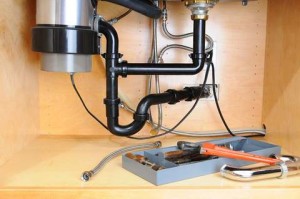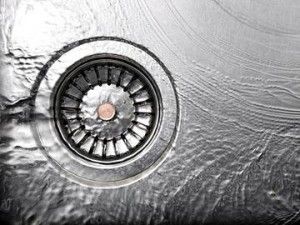Why Is Water Leaking From My Garbage Disposal?
In many cases, a garbage disposable leak is an easy fix, but before the problem can be fixed, it’s important to understand some of the common reasons why these devices begin to leak. A typical garbage disposal has several potential failure points, so there is no shortage of places where a leak can develop.
Once the leak has been found, appropriate steps can be taken to fix the problem. Some leaks can be fixed without professional help, but it’s almost always better to hire a professional plumber to correct the issue. Let’s take a look at some common areas where garbage disposals start to leak water:
The Discharge Pipe
The bottom of most garbage disposals is home to the discharge pipe. This pipe is positioned into the sink’s drain. A seal and flange are used to connect the pipe. With everyday use, these components can start to come loose, and at some point, they’ll completely fail.
When the components around the discharge pipe fail, they’ll begin to leak water. Fortunately, if the components have only become loose, the flange can be tightened with a plumber’s wrench.
If the flange has been tightened, and the leak persists, the seal between the retaining nut and discharge pipe will need to be replaced. The good news is that this shouldn’t be an expensive fix, and for a small fee, we can correct the problem for you.
The Sink Flange
The top part of a modern garbage disposal is called the sink flange. It’s the part of the device that meets with the sink drain. There are several reasons why the sink flange might start to leak.
A very common reason involves the mounting bolts, which are used to secure the position of the flange. If the bolts aren’t tight enough, the seal can break and allow water to leak through.
In some cases, it’s possible that the plumber’s putty isn’t working correctly, and you’ll need to add some new putty to the space between the pipe and flange. This is another easy fix that we can handle for you.
The Dishwasher Connection
 Leaks can also form near the dishwasher connection. A number of garbage disposals must be connected to a dishwasher’s drain pipe. The purpose of this connection is to eliminate leftover food that falls off of the plates inside of the dishwasher.
Leaks can also form near the dishwasher connection. A number of garbage disposals must be connected to a dishwasher’s drain pipe. The purpose of this connection is to eliminate leftover food that falls off of the plates inside of the dishwasher.
A hose is a piece that connects the garbage disposal to the dishwasher unit. It’s not uncommon for leaks to form in this hose. Leaks might also develop when the hose clamp isn’t tight enough.
If the hose is leaking, you’ll need to replace the section that is leaking. If the hose clamp isn’t tight enough, the leak can be fixed by tightening the clamp. These issues can be quickly remedied by a professional plumber.
Although most modern garbage disposals are built out of durable materials, they can still spring a leak. The body is a common place where leaks can develop.
As the disposal system ages, it becomes weaker and becomes much more vulnerable to cracking. If you’ve noticed a leak, there is a good chance that it’s coming from the unit’s interior shell. Once the shell has started to crack, water will begin to emerge from the seams.
Unfortunately, if the body has sprung a leak, you’ll need to have the whole unit replaced. The good news is that we can replace your garbage disposal and recommend a suitable replacement.
Tips to Prevent Water Leaking From Your Garbage Disposal
 If you want to prevent your garbage disposal from leaking, there are several precautions that you can take. By preventing leaks, you can prevent unnecessary damage to your home and avoid costly repairs. The garbage disposal is connected to your sink drain, so water is constantly running through it.
If you want to prevent your garbage disposal from leaking, there are several precautions that you can take. By preventing leaks, you can prevent unnecessary damage to your home and avoid costly repairs. The garbage disposal is connected to your sink drain, so water is constantly running through it.
Over time, the unit can become loose and start leaking. A common problem is working the garbage disposal harder than it needs to be worked.
When the motor is pushed to its limits, it produces excessive vibrations, which can cause a number of problems.
To protect your garbage disposal from problems, you should never pour bleach into your sink because it can damage the piping seals. There are several better fluids that you can use to clean your sink, so you don’t have to risk damaging the delicate seals.
For a better scent, try tossing in some orange peels and vinegar. Another great idea is to toss some ice cubes into the sink and let the garbage disposal crush them.
Most homeowners don’t know that the ice cubes are great for sharpening the blades. Another precaution involves paying attention to how much food you’re loading into the garbage disposal.
You never want to overload the disposal with too much food. It’s best to keep the food load light and work your way through one plate at a time. When you fill the garbage disposal with too much food, it produces excessive pressure and can cause damage to the components.
Check the Connections
Leaks can be very annoying, but in many cases, they’re not too difficult to fix. Many common leaks are caused by loose components. A typical garbage disposal has several different components, and over time, these parts can loosen.
If you’re trying to fix a leak, you should always check the connections. If the leak is quite large, you might notice that one of the components is noticeably loose. A quick tightening should solve the problem and make the leak go away.
Inspect for Possible Cracks
It’s very common for pipes to develop cracks, so these are the first components that you’ll want to check for cracks. Although they’re not nearly as common, cracks can also develop in the body of the garbage disposal. Seals and gaskets can also start to leak because they weaken with daily use.
The cracks that cause a garbage disposal to leak can develop in random places, so it’s important to inspect the entire unit. We can detect and correct any leaks in your system, and since we’re professional plumbers, you can trust that the repairs will be handled correctly.
For quality services in your Oklahoma City home, call Hull Plumbing at (405) 246-9763.
The post Prevent a Leaking Garbage Disposal appeared first on Hull Plumbing.

